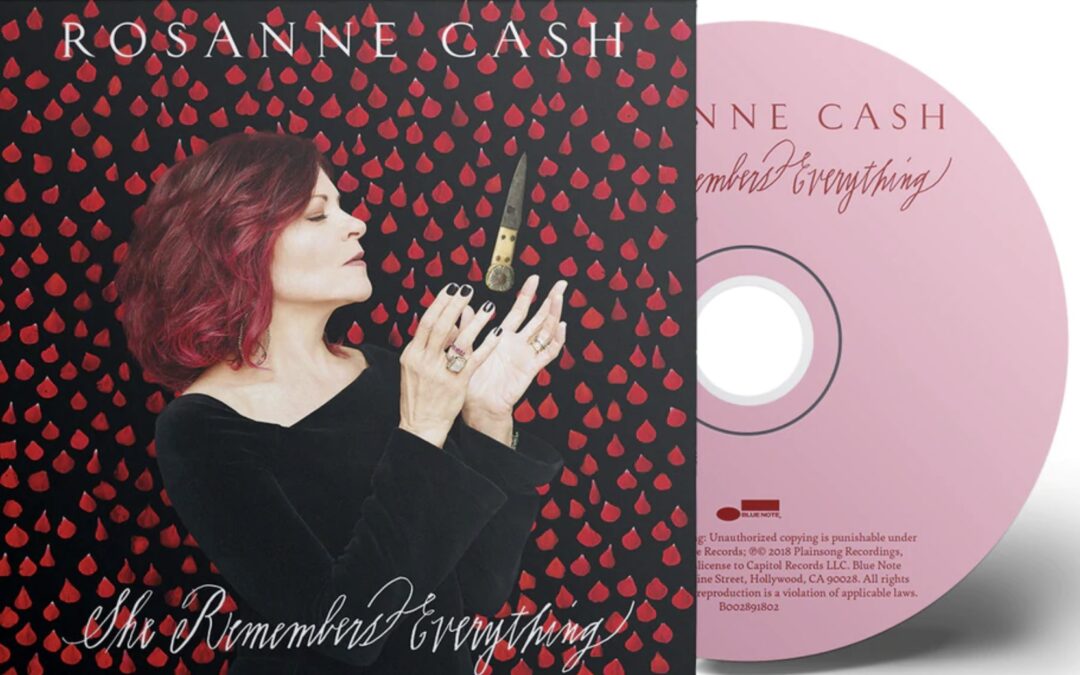Singer-songwriter Roseanne Cash began life in the musical river town of Memphis, Tennessee, the daughter of Vivian Liberto and Johnny Cash, a Country singer who was not yet the legend he would become. The Cash family relocated to Los Angeles, California, in 1958 when Roseanne was three. After her parents divorced in 1966, 11-year-old Roseanne moved to Ventura, California, with her mother and siblings, graduating from St. Bonaventure High School in 1973. She soon began traveling with her father, who was a star by that time, first working as his wardrobe assistant and eventually becoming a backup singer and occasional soloist.
Cash first recorded Kris Kristofferson’s song, “Broken Freedom Song,” in 1974 on her father’s album, “Junkie and the Juicehead Minus Me.” She spent a year in London, England, working for CBS Records, but she returned to Nashville, Tennessee, in hopes of graduating from Vanderbilt University. However, she decided to go back to California to study method acting at Lee Strasberg Institute.
By 1978, Cash had decided that pursuit of a musical career was more appealing than her acting classes and released a self- titled album. The album was mainly produced in Munich, Germany, but three tracks were recorded in Nashville and produced by talented singer, songwriter and producer Rodney Crowell.
Although the album was never released in the United States, it caught the attention of Columbia Records. Cash began playing with Crowell’s band, “The Cherry Bombs,” and the pair fell in love while working together. Cash and Crowell were married in 1979 and soon after she began working on her next album. In 1980 Cash’s album, “Right or Wrong” produced the hits, “No Memories Hangin’ Around,” “Couldn’t Do Nothing Right,” and “Take Me, Take Me.”
In 1981 the couple settled in Nashville, and Cash gave birth to their child. She was also working on what has become her signature album, “Seven Year Itch.” The title track reached No. 1 on the Billboard Country Chart and No. 22 on the Billboard Pop Chart. Cash went on to release a 1982 album, “Somewhere in the Stars.”
Her third album, 1985’s “Rhythm and Romance” produced the hits, “I Don’t Know Why You Don’t Want Me,” and “Never Be You.”
Cash’s second gold album, “King’s Record Shop,” produced Cash’s cover of her father’s hit, “Tennessee Flat Top Box,” and John Stewart’s, “Runaway Train.” Cash’s first compilation album, “Hits 1979-1989” introduced Cash’s No. 1 version of the Beatles song “I Don’t Want to Spoil the Party” and another hit “Black and White,” that earned her a fifth Grammy nomination. Cash produced and co-wrote her 1990 album, “Interiors,” which discussed her rocky marriage with Crowell. Although controversial, “Interiors” received a Grammy nomination for Best Contemporary Folk Album.
In 1992 Cash divorced Crowell and in 1995 she remarried songwriter and producer, John Leventhal. Together they co-produced Cash’s album, “The Wheel,” a memoir of her marriage to Crowell.
Cash has been nominated for 15 Grammy Awards, and she has won four of them. She has released 15 albums and has had 21 top 40 hits. 11 of the top 40 hits were number one singles. Cash is an author of four books and countless essays, some of which have appeared in The Rolling Stone, The New York Times, The Nation and The Oxford American.
Cash was awarded with an honorary doctorate from the Memphis College of Art, where she gave a commencement speech for the graduating class of 1997. Cash became pregnant with her fourth child, Jakob, in 1998. She put her career on hold and left her album, “Rules of Travel” undone until it was released in 2003. Cash and her father joined together in the track “September When It Comes,” the last recording Johnny made before his death in September 2003.
Cash developed a polyp in her vocal cords and was unable to sing for two years. During her healing process she began writing a children’s book, “Penelope Jane: A Fairy’s Tale.”
In 2006 she released her album, “Black Cadillac.” The album commemorated the loss of her father, Johnny Cash, her mother, Vivian Liberto, and her step-mother, June Carter Cash. “Black Cadillac” was nominated for the Grammy Award for Best Contemporary Folk/ Americana Album.
In 2007 Cash was diagnosed with Chiari Malformation, a disease that can cause deafness, paralysis and death. She underwent surgery and was forced to relearn speech patterns, but she was not defeated. In 2008 she returned to the stage and in 2009 she began a project called “The List.”
When Cash turned 18, her father gave her a list of what he thought were the 100 most essential American songs. “The List” had 12 songs and included duets with Bruce Springsteen, Rufus Wainwright, Elvis Costello and Jeff Tweedy. “The List”won the Americana Music Album of the Year. Cash’s next album, “The River and The Thread” received three Grammy Awards. In 2010 Cash’s childhood memoir, “Composed,” became a bestseller.
The star is involved with Children Incorporated, an organization that educates needy children. She is a member of P.A.X. which works to prevent gun violence among children. Cash has also worked with Arkansas State University on an initiative to raise money to restore the home of her father in Dyess, Arkansas.
She served as 2015- 2016 Artist-in-Residence at the Country Music Hall of Fame Museum in Nashville, Tennessee, and continues to perform for audiences at home and abroad.
– story by Sasha Dunavant, Country Reunion Music © 2022
The role of the family is an integral theme of Country Music. Some of Country’s greatest songs have captured memories from family life. Family acts, including sibling duos, have long been a staple on the Country stage. Some families have produced numerous talented members, both performers and songwriters, who separately made their impact on the genre. In other families, each generation has expanded the legacy of the one before it. This story is part of a series published in our magazines that celebrates Country Music’s family connections.

